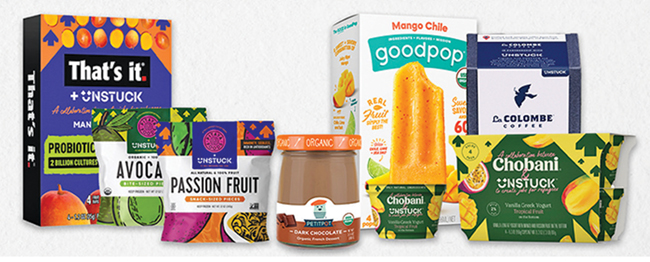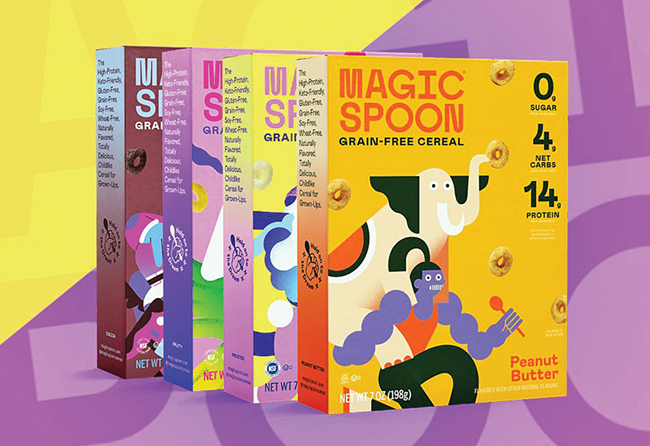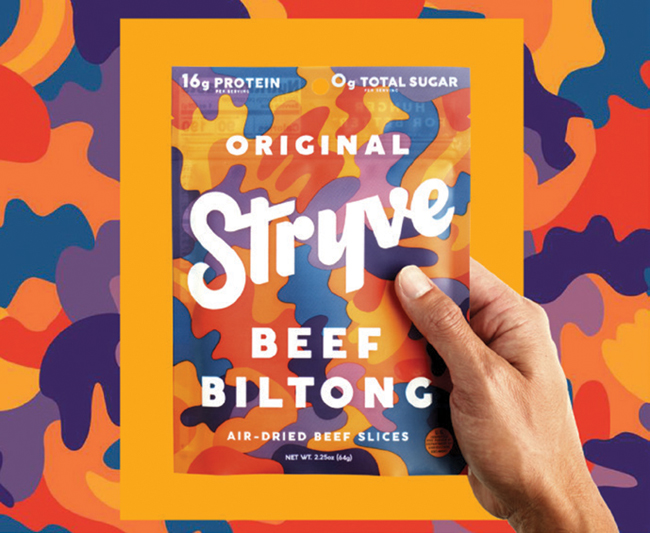NOSHscape: The Latest Food Brand News
UNSTUCK Launches New Products, Celebrates ‘Friction-less’ Model Success
After a successful first year of operation, refugee-employment initiative UNSTUCK has announced a slew of new partnerships and co-branded SKUs to support its growing supplier network which is composed of companies committed to hiring refugees, helping them economically integrate into their new host community.
With six brands now on board, UNSTUCK is now supported by seven new products: Chobani Vanilla Greek Yogurt with Tropical Fruit, That’s it. Mango Probiotic Fruit Bar, La Colombe Monaco Medium Roast Coffee, GoodPop Mango Chile popsicle, Petit Pot Dark Chocolate Organic French Dessert, Pitaya Foods Natural Passion Fruit Pieces and Organic Avocado Pieces.
“You can imagine in the last year, having any conversation that involves the word supply chain or suppliers was a difficult hurdle to cross,” said O’Flaherty. “But the brand partners [soon] saw that this wasn’t going to be disruptive, that the model was frictionless and that we provided any additional support that was required.”
“It’s almost like we needed to create a new category [of nonprofits] where, this is business as usual and brands aren’t sacrificing anything” he continued.
Launched last June, UNSTUCK is a consumer-facing initiative developed by the Tent Partnership for Refugees, a non-profit organization co-founded by Chobani CEO, Hamdi Ulukaya, that mentors and supports displaced people. UNSTUCK works directly with brand partners to identify a potential SKU, either existing or new, and determine what ingredients can be sourced from refugee-hosting regions to make a co-branded product.
Next, the organization matches the brand with potential suppliers in its network or works with new suppliers and local NGOs to implement refugee hiring programs. Once the SKU has been developed, UNSTUCK provides branding guidelines but otherwise lets the brand “do what they do best, which is creating these amazing products,” according to O’Flaherty.
“We provide any additional resources or technical expertise that they may not have in order to successfully hire and integrate refugee talent [into their supply chain] without much of an additional lift,” he said.
This initial brand cohort sources UNSTUCK ingredients from suppliers in Colombia and Peru. O’Flaherty noted that while the program has the strongest supplier relationships in Latin America due to its past work in the region, it intends to help support refugees through this program across the globe.
UNSTUCK’s debut co-branded SKU with Chobani, a Mango & Cream Greek yogurt, established a proof of concept for the initiative, said O’Flaherty and gave it something to point to when it began working with new potential partner brands. The first year also allowed UNSTUCK “to be confident in the business model and operating model overall,” he said. Although the debut SKU had limited distribution, it was successful in the markets it was available in and allowed them to “kick the tires” on the program before deploying it on a larger scale.
UNSTUCK is now working toward its three-year goal of helping existing suppliers expand their workforce to be made up of 20% refugees. The program is also in talks with a few other brand partners including Tony’s Chocolonely and aims to continue bringing more brands, products and suppliers on board.
Although not every ingredient in an UNSTUCK product comes from a refugee supporting supplier, O’Flaherty said this new cohort has taken some matters into their own hands, creating an unintended but positive ripple effect of refugee hiring outside of the program.
A heightened interest in supply chain functions has also been gaining traction among consumers due to the disruptions of the past year. O’Flaherty said the consumer demand for more transparency throughout the value chain has been an unanticipated, positive outcome of the otherwise negative situation.
He said UNSTUCK wants to ensure these long term partnerships and each SKU are successful and the program has recently launched its first awareness campaign. As it looks to its next stage of growth O’Flaherty emphasized that the impetus behind the mission is to continue to cultivate and expand its supplier network with a focus on emerging economies hosting large numbers of refugees.
Over the next five years, UNSTUCK also aims to reach beyond food and into apparel, personal care and home goods, among other sectors. By expanding its presence, it aims to help the increasing number of refugees economically integrate into their new host country. O’Flaherty highlighted the urgency of this issue, noting that since the initiative launched last year, the number of refugees has also increased, from approximately 30 million to 36 million, due to humanitarian and political crises in countries like Ukraine, Afghanistan, and Myanmar.
Mondelēz To Acquire Clif Bar For $2.9 Billion
Food conglomerate Mondeléz International has agreed to pay $2.9 billion, with additional contingent earn out consideration, to acquire organic snack bar maker Clif Bar & Company.
Founded in 1992, Emeryville, California-based Clif is the leading protein and energy bar brand in the U.S., according to data cited by the company. Clif generated over $800 million in sales across products from its eponymous brand, as well as female-focused LUNA and Clif Kids. Under CEO Sally Grimes, the brand has begun moving outside of bars with products like CLIF Bar Thins, an exclusive with Walmart, and CLIF Pop’n Crunch with the aim of becoming a $2 billion business.
“Mondeléz International is the right partner at the right time to support Clif in our next chapter of growth,” said Grimes. “Our purposes and cultures are aligned and being part of a global snacking company with broad product offerings can help us accelerate our growth while staying true to our deeply ingrained Five Aspirations – sustaining our people, planet, community, business, and brands – five bottom lines that have grounded our company since its founding and will remain our North Star going forward.”
For Mondeléz, the deal reflects the company’s intent to grow its range of snack and bar business through M&A, having added refrigerated bar Perfect Snacks in 2019 and better-for-you chocolate and cracker brand Hu in 2021. Adding Clif brings its global snack bar business past the $1 billion mark, according to a press release.
“We are thrilled to welcome Clif Bar & Company’s iconic brands and passionate employees into the Mondeléz International family,” said Dirk Van de Put, Chairman and CEO of Mondeléz International, in a press release. “This transaction further advances our ambition to lead the future of snacking by winning in chocolate, biscuits and baked snacks as we continue to scale our high-growth snack bar business. As a leader and innovator in well-being and sustainable snacking in the U.S, Clif Bar & Company embodies our purpose to ‘empower people to snack right’ and we look forward to advancing this important work with Clif’s committed colleagues in the years ahead.”
Clif will continue to run operations from Emeryville and retain its existing manufacturing sites, according to the release. The deal is expected to be top-line accretive in year two and to create cost synergies by using Mondeléz’s infrastructure to expand distribution and enter new channels and markets.
The deal is expected to close sometime in Q3 2022.
Magic Spoon Raises $85 Million And Hits Target Shelves Nationwide
After three years in ecommerce, Magic Spoons grain-free, low-sugar cereals are spilling into retail.
The company announced its top three SKUs – Fruity, Cocoa and Peanut Butter – are rolling out exclusively to Target stores nationwide following the close of a star-studded, $85 million capital raise.
The round was led by HighPost Capital with participation from Siddhi Capital, Coefficient Capital, Constellation Capital, Carter Comstock, and more. The brand also secured investment from a group of celebrities including Shakira, Russell Westbrook, Halsey, The Chainsmokers, Amy Schumer, Odell Beckham Jr. and Nasir “Nas” Jones.
“We’ve been getting to know HighPost for well over a year now, and beyond getting along well with them on a personal level, they share our vision for what success looks like, and are fully aligned with our chosen path to get there over the coming years,” said Gabi Lewis, co-founder of Magic Spoon. “The celebrity investors are all true consumers of the brand – so we’re excited to have such amazing and well-known individuals as genuine ambassadors and fans.”
In 2019, Magic Spoon closed a $5 million round after only being on the market for five months. At the time, Lewis said a brick and mortar launch would not happen in the immediate future, but noted the brand had received plenty of interest from retailers. Now, that future is in view and the cereals will soon roll out to over 1,350 Target stores, priced at $9.99 per box.
Magic Spoon has emerged as an early player in keto-focused cereals, aiming to reinvigorate a category packed with high sugar,
unhealthy products aimed mainly at children. Brands like Love Grown and Kashi have since followed suit, launching their own versions of “Cereal 2.0.”
According to Lewis, the brand’s initial D2C model was essential to its early growth as it took on and established a presence in the “tired” cereal category. Now he believes the business is “beyond” ready to accelerate and that Target’s history of launching D2C brands at retail makes its brick-and-mortar debut a “true partnership.”
“We’ll be leveraging our D2C expertise to drive trial in store; they’ll be supporting the launch in various ways in store,” Lewis explained. “We have a handful of additional exciting retail partnerships coming up later this year and next too, and in all cases we’ll be leaning into making sure the partnerships are home-runs.”
Magic Spoon cereals contain up to 14 grams of protein and 4 grams of carbs per serving, depending on the SKU. The product also taps timely consumer demands with its callouts for low sugar, and no added sugar, gluten, soy and artificial ingredients. The full lineup includes flavors like Cinnamon Roll, Frosted, Blueberry Muffin, Maple Waffle and Cookies & Cream.
Despite its narrow channel focus, Magic Spoon has not shied away from experimentation. In addition to building out an 8 SKU cereal lineup, last year the brand launched limited edition cereal bars in two flavors, Cookies & Cream and Cocoa Peanut Butter, which will be joining its permanent lineup.
Lewis said this capital will help enable the brand to execute against this “true inflection point” in its growth over the next few years as it moves into physical sales channels for the first time and transitions operations to support an omnichannel strategy.
“We want to make sure we can fully execute on that transition, and that means continuing to invest in building out a world-class team, brand-building, product development, and supply chain,” said Lewis. “On top of that, we’re of course entering a period of
economic uncertainty, and it’s important to us that we can take a long term view on growing this business and weather any short term storms.”
Stryve Brings on Seasoned Exec as New CEO
Meat snack brand Stryve has added CPG executive Christopher Boever as CEO, replacing co-founder Joe Oblas, who will transition to Chief Growth Officer. The news came as the now publicly traded company tries to deepen its hold in the meat snack category, further build out a sub brand and fight back against rising ingredient and operations costs.
“I never aspired to be the CEO,” Oblas said of the change. “I’ve always been working toward a succession plan to bring in a strong manager to lead the company once we achieved a certain size.”
The producer of the Stryve, Kalahari and Vacadillos brands of meat snacks, the company was previously run by Oblas and Jaxie Alt, who held co-CEO roles. Alt, who also was the company’s CMO, departed last October. Oblas said the company pivoted from having co-CEOs once it became a publicly traded company and needed “a clear leader to call the shots.”
Boever most recently held the role of chief commercial officer at Hain Celestial, where he focused on driving sales and the company’s innovation pipeline. His resume also includes executive leadership roles at other large companies, including Pinnacle Foods, ConAgra Foods and Hormel.
“I am excited to be a part of the Stryve team. They have created customer and consumer solutions that [are] bringing new users into an already high growth category,” he said. “The team is passionate, the brands are exceptional and the future is bright….[these are] excellent brands that are on trend, taste great [and have] with tremendous upside.”
Oblas, former co-founder and COO of supplement brand ProSupps, went on to co-found Stryve in 2017 alongside Ted Casey, now company chairman. Under the new leadership structure, Oblas will focus on new product innovation.
Over the last five years, Stryve has focused on becoming the top purveyor of biltong, a dried meat snack originating in South Africa. The company made inroads in the market by building or acquiring the vast majority of the U.S. biltong production facilities. Its 2018 acquisition of D2C brand Braaitime gave Stryve one of its original two biltong production plants, while its 2020 pickup of Kalahari offered the brand a jump into the natural channel.
Stryve went public via a merger with a SPAC, or blank check company, in July 2021. Though the goal was to build out biltong offerings before heading into adjacent snacking categories, Stryve made a slight detour for its first sub-brand, Stryve Nutrition. The sub-brand debuted with a collagen protein powder and bone broth protein powder last year, and has since launched a pre-workout powder and plans to roll out a gummy supplement later this year.
In an email interview, Oblas stressed that though Stryve has nutritional products, “we are a snacking company” at heart. While the company is still devoting resources to Stryve Nutrition, Oblas said it will pause plans to move into new snacking categories.
“Strategically, a lot of the plans we laid forth were before all of the craziness in the marketplace, rising costs, inflation, supply chain, etc,” Oblas said. “What it’s shown us is that we have the ability to not only build, but dominate a category and be really good at what we’re best at. And that’s our focus for the time being.”
The brand initially began trading on the NASDAQ at $10.26 per share last summer; it has since dropped to $1.28, as of press time. On the company’s second quarter earnings call, Stryve reported net sales of $7.4 million, up 8.6% from $6.8 million versus the year-ago quarter, but operating with a net loss of $7.3 million. Oblas told analysts that Stryve was “on a path to profitability,” and in its next phase of growth would focus on a balanced growth strategy.
“Our ability to manage growth prudently and not by sales is a key to our ultimate success. This gets us to the root of our ability to manage this business and develop systems and processes for sustainable growth,” Oblas said on the call. “Speed versus sustainability should not be a choice. Rather, speed plus sustainability is the goal. We must be ready to evolve and transition as the business grows.”


Receive your free magazine!
Join thousands of other food and beverage professionals who utilize BevNET Magazine to stay up-to-date on current trends and news within the food and beverage world.
Receive your free copy of the magazine 6x per year in digital or print and utilize insights on consumer behavior, brand growth, category volume, and trend forecasting.
Subscribe


